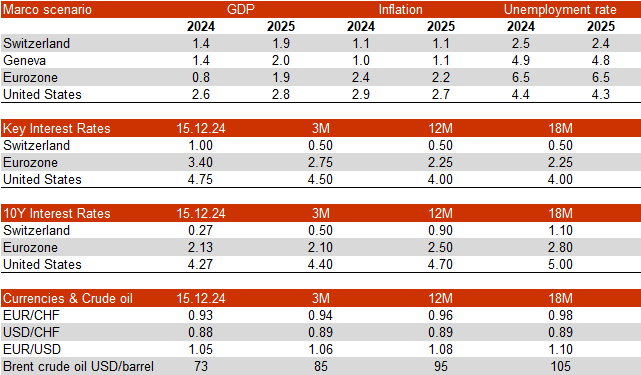Economic outlook for 2025: concentration
As we are about to enter a new year, it looks as if central banks have won the battle against inflation and will continue to cut their interest rates. In all the regions, growth is driven by only a handful of sectors, be it the technology sector in the United States, business services in Europe or the pharmaceutical industry in Switzerland. This concentration could prove problematic. In 2025, inflation in Switzerland is expected to be 1.1% with GDP growth at around 1.9% for Switzerland and 2.0% for Geneva.


Inflation under control in the United States... for now
With the elections in the United States over, the haze of uncertainty is lifting and the power is now firmly in the hands of the Republicans, led by Donald Trump. They not only won the presidential race but also control both the Senate and the House of Representatives. After this resounding victory, the S&P500 and the Nasdaq hit new record highs, and the dollar strengthened as well. Two sectors stand out in particular: the consumer discretionary sector, which could be boosted by new tax cuts, and the financial sector given the likelihood of further banking deregulation. Energy prices, above all oil prices, are falling due to an expected increase in production, which helps keeping inflation under control. However, even if Washington can boast of being self-sufficient when it comes to the country’s energy needs, it still needs metals for the technological transition, most of which are processed in China. Besides, inflation proves rather sticky, with wages, service prices and housing costs remaining high, casting doubt on the Fed’s decision to lower its key rates further in the near future.
Uncertainty in Europe
In Europe, growth is mainly driven by business services. They have taken the place of the manufacturing sector, which is seriously struggling, as can be seen with the German automotive industry. Meanwhile, Europe banks on a broader diversification of its economy. Mario Draghi, who once saved the euro, outlined a number of avenues to explore in the Budapest Declaration, recommending energy independence as a way of making the EU more competitive. The impact of his message was somewhat hampered by the current political crises in France and Germany, though.
Significant concentration on pharmaceuticals in Switzerland
